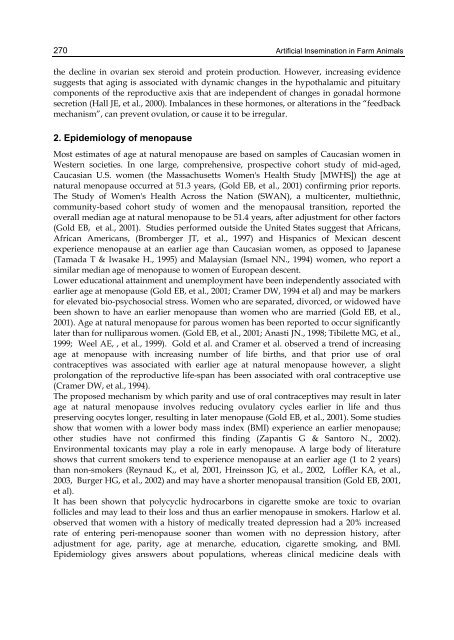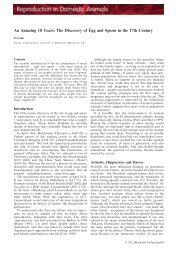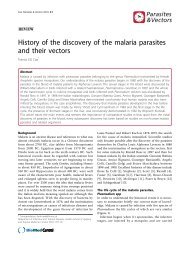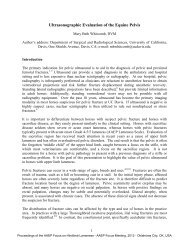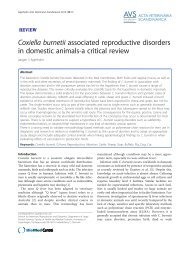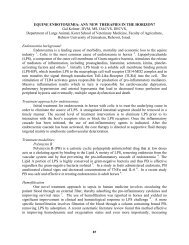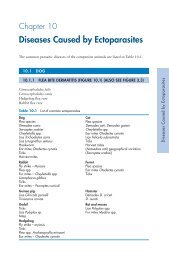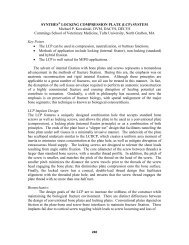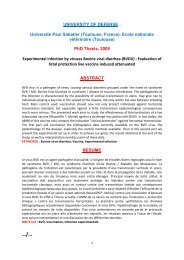ARTIFICIAL INSEMINATION IN FARM ANIMALS - Phenix-Vet
ARTIFICIAL INSEMINATION IN FARM ANIMALS - Phenix-Vet
ARTIFICIAL INSEMINATION IN FARM ANIMALS - Phenix-Vet
You also want an ePaper? Increase the reach of your titles
YUMPU automatically turns print PDFs into web optimized ePapers that Google loves.
270Artificial Insemination in Farm Animalsthe decline in ovarian sex steroid and protein production. However, increasing evidencesuggests that aging is associated with dynamic changes in the hypothalamic and pituitarycomponents of the reproductive axis that are independent of changes in gonadal hormonesecretion (Hall JE, et al., 2000). Imbalances in these hormones, or alterations in the “feedbackmechanism”, can prevent ovulation, or cause it to be irregular.2. Epidemiology of menopauseMost estimates of age at natural menopause are based on samples of Caucasian women inWestern societies. In one large, comprehensive, prospective cohort study of mid-aged,Caucasian U.S. women (the Massachusetts Women's Health Study [MWHS]) the age atnatural menopause occurred at 51.3 years, (Gold EB, et al., 2001) confirming prior reports.The Study of Women's Health Across the Nation (SWAN), a multicenter, multiethnic,community-based cohort study of women and the menopausal transition, reported theoverall median age at natural menopause to be 51.4 years, after adjustment for other factors(Gold EB, et al., 2001). Studies performed outside the United States suggest that Africans,African Americans, (Bromberger JT, et al., 1997) and Hispanics of Mexican descentexperience menopause at an earlier age than Caucasian women, as opposed to Japanese(Tamada T & Iwasake H., 1995) and Malaysian (Ismael NN., 1994) women, who report asimilar median age of menopause to women of European descent.Lower educational attainment and unemployment have been independently associated withearlier age at menopause (Gold EB, et al., 2001; Cramer DW, 1994 et al) and may be markersfor elevated bio-psychosocial stress. Women who are separated, divorced, or widowed havebeen shown to have an earlier menopause than women who are married (Gold EB, et al.,2001). Age at natural menopause for parous women has been reported to occur significantlylater than for nulliparous women. (Gold EB, et al., 2001; Anasti JN., 1998; Tibilette MG, et al.,1999; Weel AE, , et al., 1999). Gold et al. and Cramer et al. observed a trend of increasingage at menopause with increasing number of life births, and that prior use of oralcontraceptives was associated with earlier age at natural menopause however, a slightprolongation of the reproductive life-span has been associated with oral contraceptive use(Cramer DW, et al., 1994).The proposed mechanism by which parity and use of oral contraceptives may result in laterage at natural menopause involves reducing ovulatory cycles earlier in life and thuspreserving oocytes longer, resulting in later menopause (Gold EB, et al., 2001). Some studiesshow that women with a lower body mass index (BMI) experience an earlier menopause;other studies have not confirmed this finding (Zapantis G & Santoro N., 2002).Environmental toxicants may play a role in early menopause. A large body of literatureshows that current smokers tend to experience menopause at an earlier age (1 to 2 years)than non-smokers (Reynaud K,, et al, 2001, Hreinsson JG, et al., 2002, Loffler KA, et al.,2003, Burger HG, et al., 2002) and may have a shorter menopausal transition (Gold EB, 2001,et al).It has been shown that polycyclic hydrocarbons in cigarette smoke are toxic to ovarianfollicles and may lead to their loss and thus an earlier menopause in smokers. Harlow et al.observed that women with a history of medically treated depression had a 20% increasedrate of entering peri-menopause sooner than women with no depression history, afteradjustment for age, parity, age at menarche, education, cigarette smoking, and BMI.Epidemiology gives answers about populations, whereas clinical medicine deals with


